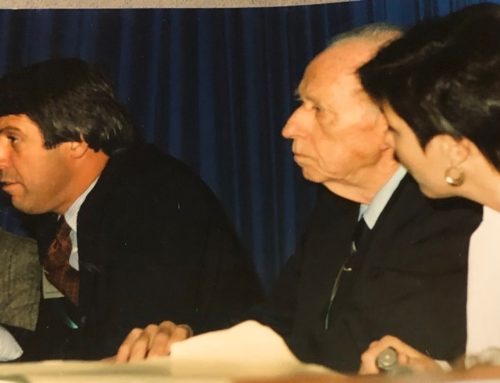by David Bork
Fred Sharp went to Florida in early 1940. He had been raised on a farm in the middle of the United States. His father had passed the ownership to him because he was creative, industrious and a hard worker. It was a very productive enterprise but he just could not continue to abide the weather. The long winters on the farm were wearing him down. The mild climate in Florida beckoned and he put the farm he had inherited up for sale. When the sale was completed, he packed up his wife, Alice, and his young family of 4 children, 2 boys and 2 girls, and made the move.
Two forces came together for Fred. It was a great time to purchase land in Florida and he had received a great price for the Iowa farm. After researching the culture of growing oranges, he bought as much land as he could afford, reserving enough money for the equipment and stock to plant all the land in orange groves.
It takes four to five years from the time of planting for an orange tree to produce. After planting his large acreage, Fred had time to get ready. His plan was to become the largest producer of citrus in Florida… and that is exactly what happened. Fred’s intense work ethic was passed along to his children and one by one they all came into the business. Twenty-five years passed and the Sharp Enterprises became extensive, for Fred had purchased every piece of farmland that came up for sale in the county. Along the way he created a holding company that held the stock in the various business units. When the time was right, he passed equal shares in the holding company to each of the children, reserving the “golden share,“ the one that had complete control of the holding company, to himself, and which, at his demise, would be passed to his wife.
The children were all well educated and prepared to take responsible positions in the business. Paul was the eldest and he loved growing things. Over the years, he became a Master Grower of citrus fruit. That included oranges, lemons and grapefruit. Helen, the second eldest, was a mathematical wiz. She loved figures and easily gravitated to keeping the business accounts. It was no surprise when she went for a degree in accounting and business. She convinced her father that it would be best for her to work outside of the family business for a number of years to perfect her skills and get broader experience. Elaine was third born of the four children and her focus was on processing of the fruit and marketing while Dan, the youngest saw potential in taking the fruit that was produced and creating added value by converting it into jam, marmalade and other products. He extracted oil from the peel of oranges and lemons and created soaps and a comprehensive line of citrus-scented cosmetic products.
Over time, Fred formed three distinct divisions that were separate, yet intertwined, companies, all owned by the holding company. He maintained regular contact with all of his children and helped them fine tune each of the operations. In the meantime, Helen had been recognized as a real business leader, a force with which to be reckoned. Being the second eldest, she had some years ahead of Elaine and Dan, in which she gained very valuable experience. That included moving up to Chief Financial Officer of the firm in which she worked. Even though she worked elsewhere, she stayed in close communication with her father, with whom she always discussed the finances of the holding company.
Fred was very proud of what he had created but after more than 40 years in the citrus business, he was a bit weary. He had the idea that Helen could become the Chairman of the holding company and oversee the three operating units. Fred and Helen had the same mindset: “Watch the money!“
With watching the family money in mind, Fred convinced Helen to take the position as chairman. Little did Fred realize that this appointment was going to become a problem for both Paul and Elaine. Each of them felt that they were operating their business unit and they were in charge. They bristled at the notion that Helen was going to be chairman, looking over their shoulders and watching how they spent the money in their business unit. After all, they were autonomous and in charge!
It seems that Paul and Elaine forgot or ignored the fact that neither of them directly owned shares in the business unit they operated and that the financial futures of they and their siblings were intertwined. Helen took the chairman position, added outside businesspersons to the holding company Board of Directors and began to operate as she knew best from her strong base of experience outside of the company.
It was not long before both Paul and Elaine began to evidence passiveaggressive* behavior toward Helen. They refused to have the budgets for their divisions reviewed at the Holding Board level; they made material financial commitments without advance approval of the Holding Board. They refused to show up for family events if Helen and her husband and children were going to be present. Often they gave flimsy excuses as to why they could not participate.
* Passive—aggressive behavior. It is a personality trait, is passive, sometimes obstructionist resistance to following through with expectations in interpersonal or occupational situations. It is a personality trait marked by a pervasive pattern of negative attitudes and passive, usually disavowed, resistance in interpersonal or occupational situations.
It can manifest itself as learned helplessness, procrastination, stubbornness, resentment, sullenness, or deliberate/repeated failure to accomplish requested tasks for which one is (often explicitly) responsible.
They went around Helen and spoke with members of the Holding Board, coopting Helen and attempting to neutralize her efforts to function in a totally professional manner. When the efforts to influence the Holding Board members did not produce the results they sought, they lobbied Fred and finally their mother, Alice. It was a mess, both from a business operational point of view and for the family as well.
Fred was fully aware of Helen’s efforts to use International Best Practices for Family Business that included clear responsibility for positions, accountability for performance and outcomes, all measured by performance compared to preapproved budgets and more. Fred was determined not to allow his children to pull apart the fine business he had given his heart and soul to create.
Fred and Alice were losing sleep over the battle between Helen and her siblings. While this “tug of war“ was going on, Dan was happily minding his own business, producing budgets, regularly reporting performance, projecting future investment needs and generally staying out of the debate his older siblings were having.
Finally Fred had had enough. He called a joint meeting of the Holding Board of Directors and the family, including their husbands and wives. It was a very tense moment when the meeting was called to order by Helen. She announced that Fred was first on the agenda. When Fred stood up to speak all you could hear was the quiet breathing of those in the room. Nothing moved.
Fred began by reviewing his early years on the farm in Iowa and how he and Alice had made the decision to sell the farm he had inherited and move to Florida. He spoke of the early challenges and how they had all pulled together to make Sharp Holdings an economic success and a force in the community. He reminded the family of the fine life that the business had provided.
As Fred continued to speak, the tension continued to mount. Everyone wondered where this lecture was going. Then Fred dropped the “Golden Share“ bomb. “Either you all get in line with International Best Practices for Family Business or I am going to sell the entire enterprise!“ As he sat down, he reached over and held Alice’s hand, looked at her with great resolve and said nothing. .
Helen declared a 30-minute recess and some of the people left the room. No one doubted Fred’s resolve to sell for they all knew him to be a man of his word. It all happened so fast that we didn’t observe who left the room together but Elaine and Paul came back together. In her role as Chairman, Helen asked who would like to speak first and Paul stood up. His voice was shaking as he reported that he and Elaine wished to apologize for opposing Helen’s “Best Practices“ efforts. He said that both he and Elaine knew Best Practices were the right thing to do but they felt that they were being treated like children and even cited some childhood events that they all remembered, events where fairness and control were issues. He acknowledged that neither he nor Elaine wanted to be responsible for their father’s decision to sell the family company. Paul made it very clear the that sale of the company would lead to family members being estranged from one another and would be tantamount to the end of the Sharp family as they had known it.
It took a series of meetings to heal the family riff. Helen was deeply hurt by the actions of her brother and sister for she was very clear that not only was it the correct strategy, but she was doing her very best to conduct the business in a manner that would make her father proud of all of them.
Surprisingly, it was Dan who was the real “peace maker“ in the family. In the series of meetings with the family business consultant that followed, he was the one who most often proposed an alternative or a suggestion that made it possible to resolve a pending issue. His language was always positive and upbeat, saying that he was willing to do whatever was necessary to make Sharp Citrus Products, the new name of the company, the leading business in their industry. Working together and using Best Practices, that is exactly what happened!
Does Your Family Business Need Help?
Family Business Matters has extensive experience assisting family businesses. With many decades of experience, we understand the wide variety of challenges that families face as they work together to build, grow and sustain a thriving family business generation after generation. Through conferences, continuing education programs, family business retreats, speaking engagements and private family business consulting services, Family Business Matters has assisted more than 450 family-owned businesses around the world chart their way through family business issues of all shapes and sizes.
Contact Us
For more information on how Family Business Matters can help your family business survive and thrive, please contact us today at (970) 948-5077.






